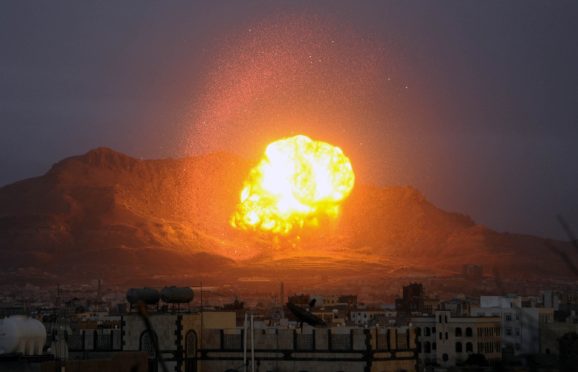
Britain is “narrowly on the wrong side” of international humanitarian law over arms sales to Saudi Arabia during the conflict in Yemen, a parliamentary inquiry has warned.
The House of Lords International Relations Committee concluded it was “highly likely” that UK weaponry had caused “significant” civilian casualties in the course of the four-year civil war.
It said relying on assurances by the Saudis that they were not targeting civilians was not an “adequate way” of implementing the UK’s obligations under the international Arms Trade Treaty.
The Government has faced repeated calls to suspend arms sales to Saudi Arabia after it began air strikes in March 2015 against Iranian-backed Houthi rebels who seized control of large swathes of the country.
Last year the United Nations Human Rights Office estimated at least 6,600 civilians had died as a result of indiscriminate bombing and another 10,000 injured, although it acknowledged the true figures were likely to be significantly higher.
In its report, the committee said that since the start of the conflict the UK had licensed £4.7 billion of arms exports to Saudi Arabia and a further £860 million to its partners in the international coalition against the Houthis.
Typhoon jet fighters and associated systems accounted for the majority of exports approved for the Saudis.
In evidence to the committee, ministers argued that the Government’s licensing process was “narrowly on the right side of international humanitarian law”.
The committee however said: “Although conclusive evidence is not yet available, we assess that it is narrowly on the wrong side.
“Given the volume and type of arms being exported to the Saudi-led coalition, we believe they are highly likely to be the cause of significant civilian casualties in Yemen, risking the contravention of international humanitarian law.”
The committee said relying on Saudi-led review processes into incidents of suspected civilian casualties was not sufficient to meet Britain’s obligations under international law.
“We are deeply concerned that the Saudi-led coalition’s misuse of their weaponry is causing, whether deliberately or accidentally, loss of civilian life,” it said.
It added: “Export licensing decisions for the sale of arms always require fine judgments, balancing legitimate security concerns against human rights implications, and each situation must be assessed individually.”
Overall, the committee described the humanitarian situation in Yemen, with more than 10 million people reliant on World Food Programme support, as “unconscionable”.
It called on the Government to give a “much higher priority” to resolving the crisis and not just mitigating the situation.
Ministers, it said, should immediately condemn any further violations of international law by the Saudi-led coalition, including the blocking of food and medical supplies, and, if necessary, suspend export licences to key coalition members.
The committee also called on the Government to do more to support the UN peace process in Yemen, including considering appointing a special representative in London to back up the efforts of the UN special envoy.
The committee chairman, Conservative former Foreign Office minister Lord Howell of Guildford, said ministers must address the “root causes” of the suffering.
“The humanitarian situation in Yemen is unconscionable,” he said.
“That the UK is the second-largest exporter of arms to Saudi-Arabia, and the fifth-largest donor of humanitarian aid in Yemen is a contradiction which the Government must address as a matter of urgency.”

Enjoy the convenience of having The Sunday Post delivered as a digital ePaper straight to your smartphone, tablet or computer.
Subscribe for only £5.49 a month and enjoy all the benefits of the printed paper as a digital replica.
Subscribe